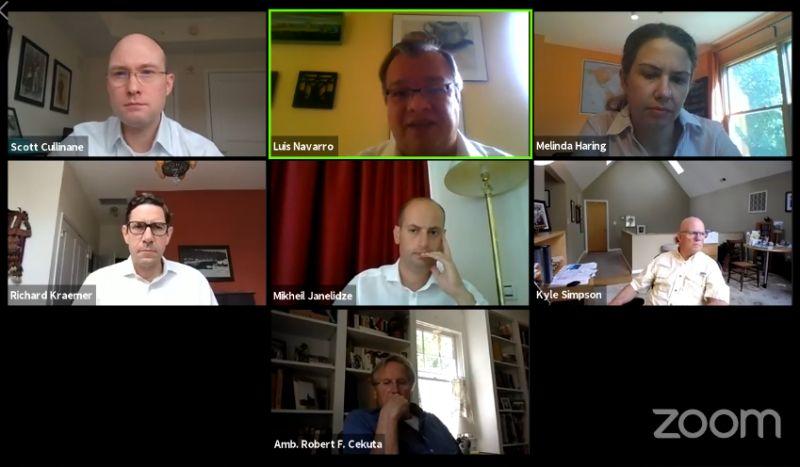Washington panel: Is Georgia still safe for Azerbaijani dissidents?

Georgia and Azerbaijan share "common interests in solving any issue" between two countries and steering the regional economy towards betterment, Mikheil Janelidze, Georgia's former foreign minister, said on Friday at a panel organized by Washington-based US-Europe Alliance.
"Our countries have strategic interests... If Azerbaijan wants to be a hub for energy, trade, or data connection, etc, it can't do it without Georgia," he said. More particularly, he was talking about recent challenges between the two countries in terms of Azerbaijan's increasing interest in moving fiber-optic cable through Georgia in order to boost the country’s digital independence from Russia.
For Luis Navarro, a Eurasian program fellow at the Foreign Policy Research Institute, cooperation between Baku and Tbilisi on this issue will indicate whether they are truly aligning themselves with the West.
In the meantime, he added, "it's also important for the West to shift its view of Georgia from being a country that has its parameters to the Caucasus, and expand it to Black Sea".
For Janelidze, cooperation on fiber-optic cable between Baku and Tbilisi will be beneficial for not only both sides, but also for the U.S. interests in the region.
Asked by TURAN's Washington correspondent whether if Georgia still was safe for Azerbaijani independent voices living abroad, particularly those are critical of government, Navarro said, journalist Afgan Mukhtarli's case "raises the question of to what extent is there a transactional relationship between the Georgian government and its neighbours around dissidents."
"it's hard to imagine how the abduction of an Azeri journalist in Tbilisi in 2018] would have been possible without prior knowledge of the Georgian security services," he said. Similar narrative could be seen around Turks who are living in Georgia and are opposed to Erdogan, he added.
The question here, he said, is about what the Georgian governments' approach is in terms of human rights considerations in the region.
"Much depends on Georgian people in terms of moving towards Western direction and how Georgia can help itself continue being a source of economic investments which depend on democratic reforms," he argued.
For Mikheil Janelidze, Georgia's former FM, Tbilisi has to "do its best" to show that it continues democratic path while at the same time, it can be a reliable bridge for Black Sea-Caspian connection.
 Latest news
Latest news Latest news
Latest newsGreece Plans to Exclude Turkiye from Future Defense Contracts
20.Feb.2026
U.S.-Based Mars Launches Major Investment Project in Kazakhstan
20.Feb.2026
Parliamentary Elections 2026 in Armenia as a Geopolitical Referendum
20.Feb.2026
Russia and Ukraine Fail to Reach Agreement in Geneva
19.Feb.2026
The South Caucasus in U.S. Foreign Policy: Implications of High-Level Visits for Russian and Chinese Regional Aspirations
18.Feb.2026
Ukraine Imposes Personal Sanctions on Belarusian President Alexander Lukashenko
18.Feb.2026
72% Against the Authorities: Economic Dissatisfaction Hits Record Levels in Turkiye
17.Feb.2026
Bulgaria Strengthens Defense: First American Stryker Vehicles Delivered
17.Feb.2026
Moscow Criticizes Plans to Build a U.S.-Backed Nuclear Power Plant in Armenia
16.Feb.2026
Washington expects Tbilisi to strengthen ties amid regional changes
15.Feb.2026

 28 Feb 2026
28 Feb 2026









